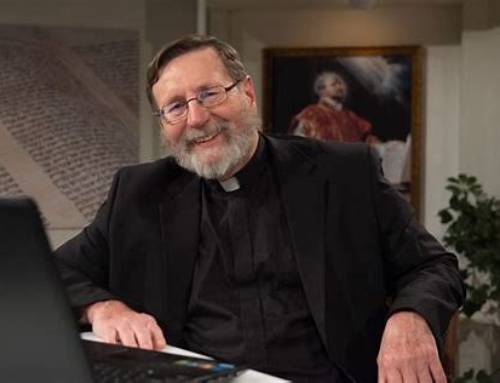In today’s gospel (Mark 3: 20-35) Jesus explains the unforgivable sin. The Pharisees, having witnessed Jesus performing an exorcism, said he did it by the “Power of Beelzebub”–or Satan. Jesus challenges them with two parables–a kingdom set against itself and a thief needing to bind a strong man before he robs him. He then says the Pharisees have “blasphemed the Holy Spirit” and this is the unforgivable sin, but Jesus’ saying leaves us with more questions than answers.
Eager to avoid the unforgivable sin, we want to know exactly what “blaspheming the Holy Spirit” is. Well, on the surface it is to ascribe to Satan what is the work of God. This should lead us to be cautious in our criticisms of other Christians and cautious in our criticisms of our pastors and other church leaders. When folks throw around the “heretic” label and condemn the pope or bishops they disagree with I worry. Best to leave the judgement to God. When non-Catholics say the Catholic Church is the “whore of Babylon” and the pope is the antiChrist aren’t they veering pretty close to what Jesus calls “blaspheming the Holy Spirit”? It feels that way.
However, we need to press this saying a bit further. What is the root problem in “blaspheming the Holy Spirit”? It saying that what is of God is actually of the devil. In other words it is calling good, evil. Similarly it is to call something evil, good. Now this widens the discussion considerably, and when we look around at the church and world today it is rife with people calling evil good and good evil. A few examples from this month’s news: Homosexual activity? Evil. We’re supposed to call celebrate it. Terrorist and military attacks on innocent civilians? That’s evil, but some folks are saying it’s good? Abortion. Evil. We’re supposed to say it’s good. Sexual re-assignment surgery for minors? Evil. We call it good. Catholicism and Christianity in general? Good but the world says it’s evil. You get the idea.
Now what is the psychological and spiritual state of the person who calls evil good and good evil? They have lost the ability to see evil and discern good. They have lost the sense of sin and this means, by definition, they are unable to repent. You can’t repent of a sin if you don’t think it’s a sin and you can’t be forgiven for that sin if you are not able to repent of it. So the “unforgivable sin” is not some particular naughtiness that God arbitrarily decides not to forgive. Instead it is an attitude of heart and mind that precludes forgiveness.
To repeat simply, If I deny that my sin is actually a sin, then I can’t repent of it and therefore cannot be forgiven. When we consider this wider definition then whenever we get ourselves into a mindset that justifies our sin, overlooks our sin, denies that it is a sin at all, then we’re in danger of falling into the quicksand of the unforgivable sin.
And haven’t we all done this? “Oh, that thing I did is not sooo bad! Everyone does it. I’m only human after all! The circumstances pushed me into it. I meant well, but things went the wrong way. I couldn’t help it. My mother didn’t love me enough or my mother loved me too much. It’s my wife’s fault. It’s my husband’s fault. The devil made me do it…
…and now we’re back to today’s first reading from the story of the Garden of Eden…






When we were children, we idolized the heroes. As adults, we start to empathize with the villains and realize that some of them do make sense. And if we go one step further, we realize that given the “right” company, circumstances, background experiences, unchecked ideas, and troubled upbringing, we could become those who we hate to love (or love to hate).
This is undoubtedly a very tough pill to swallow, perhaps for an overwhelming majority of us. On our best days, it’s easy to operate on a cartoon mentality categorizing people as “malicious oppressors” and “innocuous victims”, pull the Pontius Pilate “hand-washing” card, and define our virtue based on the wrongdoing we (supposedly) don’t commit. It is triggering thought – to consider the possibility that we are capable of great evil (by commission or omission) in extraordinary circumstances, all the while believing we are in the right, pursuing a good.
Perhaps this is the real incorrigible vice: Being your own best friend, and your own worst enemy, and NEVER realizing it.
Believe you are beyond criticism, and incapable of messing up, you can’t truly connect with others and form genuine relationships built on trust and love. Moreover, anything becomes permissible – just apply the logic “it takes breaking some eggs to make an omelet”, rinse and repeat.
On that note, highly recommend this YouTube channel “The Vile Eye” where popular villains from various pop culture (i.e., anime, video games, novels, comic books, TV series, etc.) are analyzed (i.e., “Analyzing Evil”). The viewer gains an insight into a villain’s proclivities, ideologies, backstory, and motivations (Make no mistake nonetheless, explanations are never excuses for immorality). These character commentaries serve as an entertaining, engaging, and educational means of examination of conscience in my books.